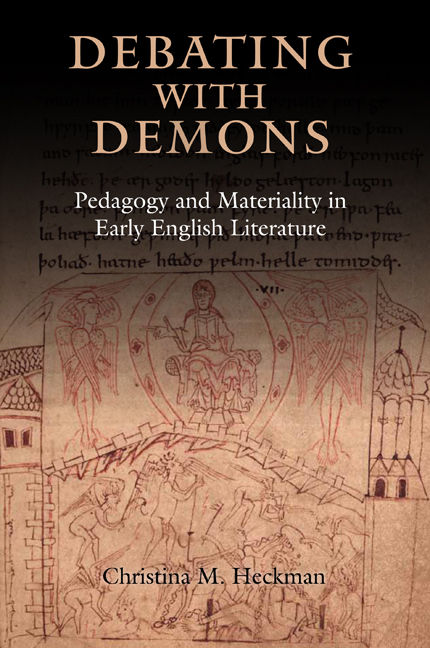Book contents
- Frotmatter
- Dedication
- Contents
- Introduction: The Devil’s Secret Chamber
- Part I Foundations
- 1 Spirituo-Materiality in the Early Middle Ages
- 2 The Artes Liberales in the Early Middle Ages
- 3 The Devil Within: Perils of Pedagogy in the Monastic School
- Part II The Demonic Magister in Early English Poetry
- 4 The Origin of the Teaching Demon: Lucifer as Magister
- 5 Demonic Teaching and the Fall in the Old English Genesis
- 6 Demonic Teaching and Saintly Discretio in Cynewulf’s Juliana
- 7 Inventing Materia: The True Cross and Saintly Disputation in Cynewulf’s Elene
- Conclusion: The Mysteries of Pedagogy
- Bibliography
- Index
- Acknowledgments
- Anglo-Saxon Studies
3 - The Devil Within: Perils of Pedagogy in the Monastic School
Published online by Cambridge University Press: 06 October 2020
- Frotmatter
- Dedication
- Contents
- Introduction: The Devil’s Secret Chamber
- Part I Foundations
- 1 Spirituo-Materiality in the Early Middle Ages
- 2 The Artes Liberales in the Early Middle Ages
- 3 The Devil Within: Perils of Pedagogy in the Monastic School
- Part II The Demonic Magister in Early English Poetry
- 4 The Origin of the Teaching Demon: Lucifer as Magister
- 5 Demonic Teaching and the Fall in the Old English Genesis
- 6 Demonic Teaching and Saintly Discretio in Cynewulf’s Juliana
- 7 Inventing Materia: The True Cross and Saintly Disputation in Cynewulf’s Elene
- Conclusion: The Mysteries of Pedagogy
- Bibliography
- Index
- Acknowledgments
- Anglo-Saxon Studies
Summary
Teaching is a holistic art, uniting the spirit and the intellect with the body and the place where it dwells. The disciplines most necessary to be taught and learned, those which enabled pupils to read, understand, and argue about scripture, were also ambiguous and potentially dangerous to both knowledge and being. Such onto-epistemological risks are incorporated into dialogues written for use in early English schools. These include not only three Anglo-Latin poems associated with the school of Bishop Æthelwold, produced in Winchester, the heart of monastic education during the tenth-century Benedictine Reform, but also the colloquies of Ælfric of Eynsham and his own pupil, Ælfric Bata. The altercatio and colloquium, dialogues which, when recited, invite schoolboys to articulate their positions as members of a privileged but nonetheless vulnerable population in the monastery, suggest that the monastic school should be viewed as a topos or locus, a ‘place’ where arguments may be found to assert the value of the monastery as an institution, its purposes, its contributions to ontological survival, and its concomitant dangers. These dialogic texts construct an early medieval view of teaching as a perilous enterprise, articulating the dangers of pedagogy and the constant possibility of demonic presence within the monastery itself.
In the arguments of monastic writers, unsurprisingly, the monastery becomes the ontological prop of Christianity, providing the skills, knowledge, and discipline necessary for salvation and eternal life. The cloister, however, is not safe from the incursions of Satan – quite the opposite. As David Brakke has claimed, ‘the Christian monk was formed in part through imagining him in conflict with the demon.’ The monastery, where geong (‘young’) scholars strive against the devil, occasionally identifying and combating diabolical behavior in their own midst, is a place with the highest possible onto-epistemological stakes. In reading scripture, monks and their pupils study and recite texts that bestow knowledge about existence itself, the mysteries of the universe and its creation. The labor of monks, their opus Dei, therefore aims to ensure survival of the most basic kind, a bulwark against annihilation. The altercatio and colloquium, which relate everyday problems of pupils in monastic schools, also convey essential insight into their authors’ views about the onto-epistemological transformations resulting from education, a dangerous activity which made pupils vulnerable even as it promised divine protection.
- Type
- Chapter
- Information
- Debating with DemonsPedagogy and Materiality in Early English Literature, pp. 73 - 100Publisher: Boydell & BrewerPrint publication year: 2020



